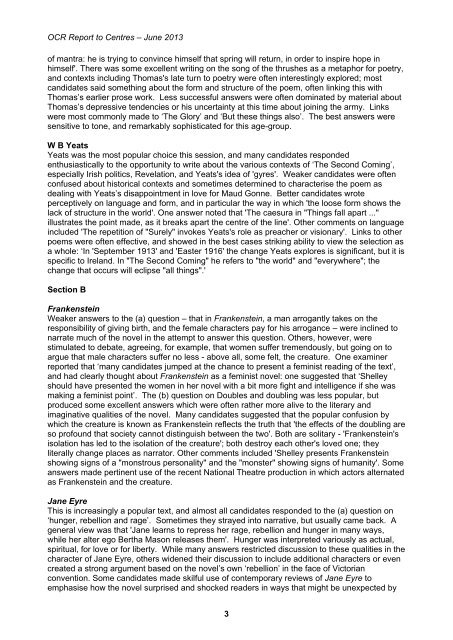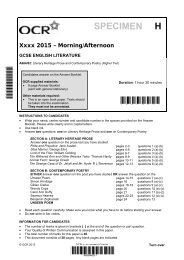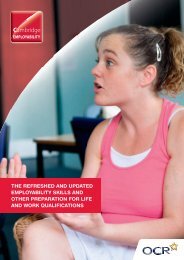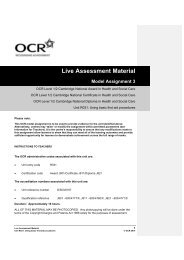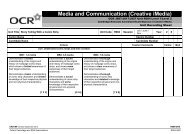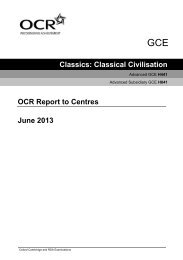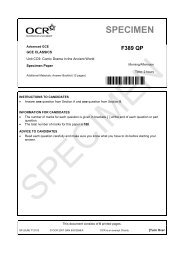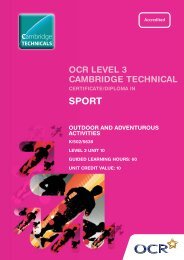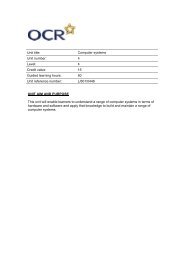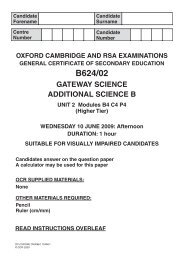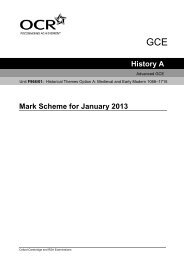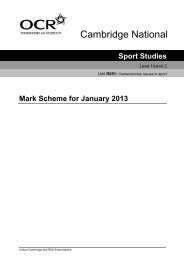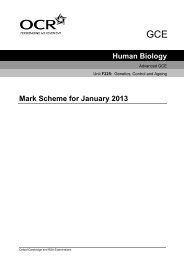Examiners' reports - June (PDF, 385KB) - OCR
Examiners' reports - June (PDF, 385KB) - OCR
Examiners' reports - June (PDF, 385KB) - OCR
Create successful ePaper yourself
Turn your PDF publications into a flip-book with our unique Google optimized e-Paper software.
<strong>OCR</strong> Report to Centres – <strong>June</strong> 2013<br />
of mantra: he is trying to convince himself that spring will return, in order to inspire hope in<br />
himself'. There was some excellent writing on the song of the thrushes as a metaphor for poetry,<br />
and contexts including Thomas's late turn to poetry were often interestingly explored; most<br />
candidates said something about the form and structure of the poem, often linking this with<br />
Thomas’s earlier prose work. Less successful answers were often dominated by material about<br />
Thomas’s depressive tendencies or his uncertainty at this time about joining the army. Links<br />
were most commonly made to ‘The Glory’ and ‘But these things also’. The best answers were<br />
sensitive to tone, and remarkably sophisticated for this age-group.<br />
W B Yeats<br />
Yeats was the most popular choice this session, and many candidates responded<br />
enthusiastically to the opportunity to write about the various contexts of ‘The Second Coming’,<br />
especially Irish politics, Revelation, and Yeats's idea of 'gyres'. Weaker candidates were often<br />
confused about historical contexts and sometimes determined to characterise the poem as<br />
dealing with Yeats’s disappointment in love for Maud Gonne. Better candidates wrote<br />
perceptively on language and form, and in particular the way in which 'the loose form shows the<br />
lack of structure in the world'. One answer noted that 'The caesura in "Things fall apart ..."<br />
illustrates the point made, as it breaks apart the centre of the line'. Other comments on language<br />
included 'The repetition of "Surely" invokes Yeats's role as preacher or visionary'. Links to other<br />
poems were often effective, and showed in the best cases striking ability to view the selection as<br />
a whole: ‘In 'September 1913' and 'Easter 1916' the change Yeats explores is significant, but it is<br />
specific to Ireland. In "The Second Coming" he refers to "the world" and "everywhere"; the<br />
change that occurs will eclipse "all things".'<br />
Section B<br />
Frankenstein<br />
Weaker answers to the (a) question – that in Frankenstein, a man arrogantly takes on the<br />
responsibility of giving birth, and the female characters pay for his arrogance – were inclined to<br />
narrate much of the novel in the attempt to answer this question. Others, however, were<br />
stimulated to debate, agreeing, for example, that women suffer tremendously, but going on to<br />
argue that male characters suffer no less - above all, some felt, the creature. One examiner<br />
reported that ‘many candidates jumped at the chance to present a feminist reading of the text’,<br />
and had clearly thought about Frankenstein as a feminist novel: one suggested that ‘Shelley<br />
should have presented the women in her novel with a bit more fight and intelligence if she was<br />
making a feminist point’. The (b) question on Doubles and doubling was less popular, but<br />
produced some excellent answers which were often rather more alive to the literary and<br />
imaginative qualities of the novel. Many candidates suggested that the popular confusion by<br />
which the creature is known as Frankenstein reflects the truth that 'the effects of the doubling are<br />
so profound that society cannot distinguish between the two'. Both are solitary - 'Frankenstein's<br />
isolation has led to the isolation of the creature'; both destroy each other's loved one; they<br />
literally change places as narrator. Other comments included 'Shelley presents Frankenstein<br />
showing signs of a "monstrous personality" and the "monster" showing signs of humanity'. Some<br />
answers made pertinent use of the recent National Theatre production in which actors alternated<br />
as Frankenstein and the creature.<br />
Jane Eyre<br />
This is increasingly a popular text, and almost all candidates responded to the (a) question on<br />
‘hunger, rebellion and rage’. Sometimes they strayed into narrative, but usually came back. A<br />
general view was that 'Jane learns to repress her rage, rebellion and hunger in many ways,<br />
while her alter ego Bertha Mason releases them'. Hunger was interpreted variously as actual,<br />
spiritual, for love or for liberty. While many answers restricted discussion to these qualities in the<br />
character of Jane Eyre, others widened their discussion to include additional characters or even<br />
created a strong argument based on the novel’s own ‘rebellion’ in the face of Victorian<br />
convention. Some candidates made skilful use of contemporary reviews of Jane Eyre to<br />
emphasise how the novel surprised and shocked readers in ways that might be unexpected by<br />
3


